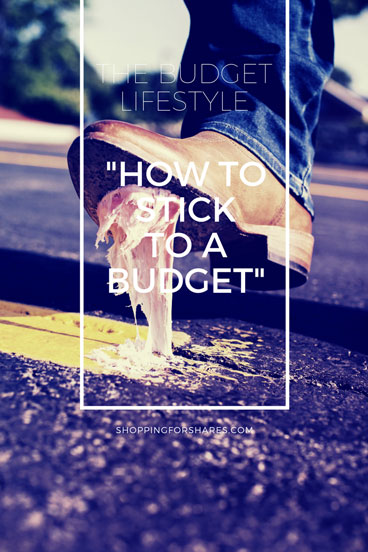 Having a budget is an excellent start to building wealth, but what if you haven’t been shown how to stick to a budget?
Having a budget is an excellent start to building wealth, but what if you haven’t been shown how to stick to a budget?
Budgets might come naturally to some people, but it actually isn’t common for most people to use one.
(That’s why most people don’t).
But instead of focusing on why people fail (which isn’t helpful to anyone), let’s try and come up with a plan on how to make whichever budget method you’ve chosen succeed.
First, you’ll make a plan to stick with it and next I’ll give you some tips to keep your motivation going so you will want to make it part of your lifestyle.
Know the Goal
The goal of your budget is to make sure you have more income coming in than expenses going out. To live below your means. We’ve established that.
And while it sounds simple in theory, for many people it’s not quite so easy.
Often people feel that if they just had more money that it would make things easier, and sure, more income definitely can help.
But more income is harder to come by than lowering expenses. You have far more control over lowering expenses than you do finding extra money every month.
Saying that you should start a business or second job or side hustle is great in theory (and I’m a fan of building side hustles if you can do it), but it’s not so easy to simply pick up extra work whenever you want it. And side hustles can often take months to see significant income (if any).
You need to start where you are. Right now. With what your current income and current expenditures are.
Step 1: Put On Your Favorite Music
Whether you are starting your budget for the first time, or you’re a seasoned budgeter, I always think that when you have to do anything that seems like a chore (housework, cooking, budgeting), that having background music makes it fun.
Do a search on Spotify or Youtube for music playlists for the artists or genres that you’re into. Or just play your favorite mp3 (or LP if you’re that old school).
Some people like ambient music, others prefer pop rock. I’m a bit of a nostalgia hits fan myself.
Now you’re good to go. Music always makes things better.
Step 2: Set Up Your Budget
The first time that you set up your budget is the longest time that you’ll spend on it. You’re probably looking at half an hour or less to set it up.
After that, you’ll tweak as you go, but it shouldn’t take you any more than ten to fifteen minutes to update each week. Knowing that it won’t take long will mean you can make time for it.
As we’ve mentioned you’ll need a section for your income, and another one for your expenses. If you know all the details you can add them in, but it’s fine if you don’t. Just get the main income and expenses in. You can add the others as they come in over the next few weeks.
Step 3: Keep Your Budget Current
Keeping your budget up to date is really the key to make it work for you. That way you’ll always have a good idea of where you are financially on any given day.
You don’t need to know to the exact decimal point, but having an overall idea of how much you can spend without issue is important.
Choose a day to update your budget with expenses and income. How often you do this depends on the regularity of your income and expenses.
Could be daily, weekly or monthly.
I prefer weekly.
At the end of the week, I go through and enter my expenses into whatever category they belong. Rent, shopping, food, etc. I also note any income I received that week (my income is variable, not fixed).
I track those expenses and income so that when I’m forecasting for the following month I have a pretty good idea of what’s normal for me and if I need to tweak any categories.
This is also the time that I pay any credit card expenses that show up on my credit card. I prefer to keep a zero balance on my card as often as I can.
Doing it this way I can see quickly if I need to cut back, or if I can afford to splurge a little. The key is knowing what you have to work with and adjusting that based on your lifestyle. That’s why tracking income and expenses is powerful.
For example, if I notice that my grocery budget is creeping up higher than normal then I can cut back the following week by searching for budget options, plan meals from the freezer/pantry, or see what items at the supermarket are on sale that week.
A note about paying bills
Most bills come electronically now through email, although I still get some in the regular mail.
I tend to pay bills as they come in and tag the emails with a specific colored flag in my email client so I can find them easily at the end of the week. Paper bills (which I get rarely) are put on my desk where I can’t miss them.
If I’m busy and can’t pay the bill right away I set up a reminder to pay the bill on either my calendar or reminder app.
For larger bills, like car insurance, that come less frequently there are three options:
Pay it all and be frugal for the rest of the month (fine if you have a good income to expenses ratio – sometimes this works for me), use savings (what I generally do if I can’t pay in full from my income that month), or put installments away to cover the bill when it comes due (works best for those with fixed incomes).
There is no right or wrong way to do it, it depends on your income and preference.
Variable incomes (like mine) will find they may be able to pay the bill in full if it was a good income month or use savings as a backup. Fixed incomes tend to work better by saving installments for the bills.
Think about what would work best for you.
Step 4: Stay Motivated
You might find that after the initial excitement of setting up your budget and tracking your spending that you start to lose interest.
Perhaps a week will go by and you forget to write something down, or you go on vacation and the weekly budget plan starts to slip.
This can also happen when you don’t see any progress being made and start to distrust the process and time it takes.
It’s a bit like a diet. You don’t see any progress at first and it can be discouraging, but like a diet, if you stick with it, it can change your life.
Social media can be a great source of inspiration. You can find tips and tricks for sticking with your budget, case studies of people who have rid themselves of huge amounts of debt, groups of people who are in a similar place in their lives as you.
If Pinterest is your thing, start a budgeting board and pin tips that inspire you. It doesn’t have to be only budgeting tips either, you can pin quotes, pictures of things you want to save for, finance books you want to read.
Follow financially inspiring Instagrammers to see how they live their lives. Some will be frugal and minimal, others will be lavish and extravagant. Everyone’s different. Just a tip though, don’t become weak to the pretty things they have/show. Instagram pictures (just like other social media) can often be an illusion.
Join Facebook groups that encourage each other with words or challenges. Find ones that are positive rather than filled with drama. You want motivation and truth. They are out there.
Go to YouTube to watch videos with money tips and ideas. There are plenty of great personal finance YouTubers on the platform. Even, cough, me.
Why having a budget and tracking expenses works
The beauty of reviewing your budget every week (or month) is that you become accountable. If you know you’ll be reviewing your purchases to enter into your budget it makes those snap decisions less likely.
You find saving money easier than before because you’ve become more mindful of your purchases going forward.
Kakeibo
There is a Japanese money saving technique called Kakeibo that claims to cut your spending by up to 35%. It’s been around for over one hundred years.
Its main principle is that you record everything you spend into a household ledger. The idea being that by tracking what you spend you become more mindful of your future purchases.
Relying on memory to determine a budget is imprecise, but by writing everything down, the figures don’t lie, it’s there in black and white to see.
Proponents claim it works because by having to write everything down, you become accountable and that changes behavior.
Sound familiar?
Tracking and recording your spending really does change your spending patterns and is why I continue to do it.
Automating your Budget
You’re also more likely to stick to your budget the less you have to do with it, which is why automation can work brilliantly.
The more that you can automate your budget the more it’ll free up time for other things.
Regular bills are usually the easiest things to automate, especially if they are fixed like the monthly internet bill.
I also like the idea of automating your savings for those on fixed incomes.
Firstly, for automation to work, you need to have money in your account, so if you’re the type of person who regularly overdraws, then automation is not for you.
I recommend keeping a minimum balance of a few hundred (or more) to make sure you’re always covered if, by chance, you forget a bill is due and go spend that money instead.
I automate my phone, internet & rent. The rest of the bills (which is generally only utility bills left) I pay as they come in.
It’s just one less thing you have to do.
Setting Up Automation
There are usually two main ways to set up automation.
Though the billing provider (there will be instructions on the bottom of your bill or their website on how to do this).
Or you can set it up yourself through your bank by creating a recurring monthly (or whatever frequency) payment.
Either option is fine, although it is easier to cancel automatic payments if you’ve set it up yourself in your own banking app. Sometimes billing providers can be pains in the ankle to try and cancel when you switch from them.
How To Use Your Budget To Get Wealthy
You’ll find that after the first month or two you’ll start to see your spending patterns. You’ll get a feel for when bills recur (whether it’s monthly, yearly, weekly or whatever), and what is your normal (even if your income and expenses are all over the place).
Once you’ve got a handle on that you’ll be able to take more control and start to plan for the next stages of becoming wealthy.
Starting a budget was the first step.
The next steps are to gain control over your spending (which you can do now since you know what money you have to work with), pay off debts (if you have them), start a strong savings plan (for the fun stuff), and finally, to invest and have your money work for you.
This isn’t a quick fix. To become wealthy will take time. But that time is going to pass by anyway, so you might as well be making plans for your future self so that when you get there you’ll thank your past self.
And knowing that there is a better financial future for you if you can stay with it is incredibly motivating. Don’t you think?
From the author
Did you find this article useful? It’s actually part of the first draft of a general finance book I’m writing. I’ve decided to blog the book (that is, write the first draft of the entire book on this blog as I go.)
The blog posts might not be in order as I skip around different sections of the book, and not everything I write may end up in print. However, it’s a good strong base for what you’ll find inside.
That means you can watch me write it, and even read the book for free (a few thousand words at a time) if you like.
Or if you want to get notified when I publish it, you can sign up to my email list below (I’m only sending out emails once the book is done and I don’t know how long that will be).
Until the next post, happy reading.
Tracey 🙂
[mailerlite_form form_id=1]


